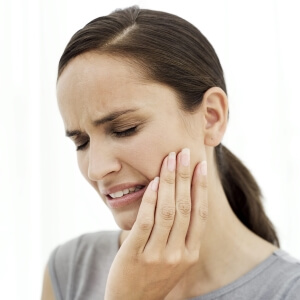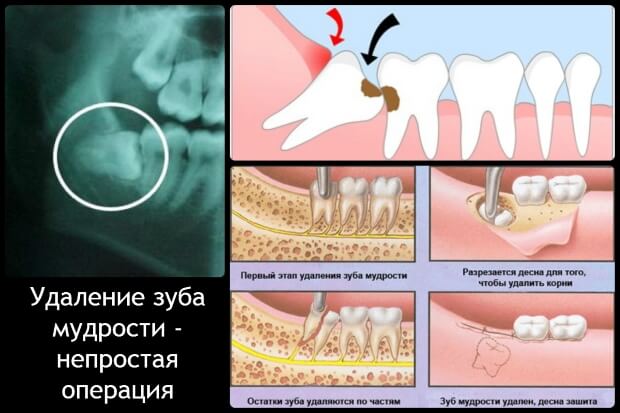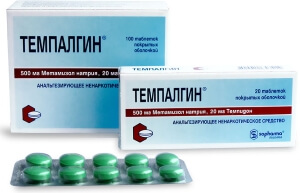After removal, an open wound is formed and it takes time for it to heal.
If pain is not accompanied by fever or severe bleeding of the gums, then there is nothing to worry about.
What to do if the gum hurts after tooth extraction at home?
Take a pain reliever. Often, unpleasant pain sensations are far-fetched, since the body is not quite used to such a loss. Try to relax.
After a tooth is removed, a blood clot forms in its place, in the hole. It prevents further bleeding and promotes healing.
If the gum hurts - do not try to relieve the pain by intensive washing with water!
Otherwise, the clot will simply wash out, the wound will continue to bleed, or the hole will remain empty and suppuration will begin in it. The gums will swell and then you will have to go to the doctor again.
In order to relieve pain in the gums, you can hold a small amount of water or infusion of soothing herbs in your mouth, but only under the following conditions:
- Infusion or water should be at room temperature. Not cold, not hot.
- The water must be boiled so as not to infect.
- Washing should not be intensive. They held it in their mouths for a bit and spat.
- Washing can be carried out only 7-9 hours after the operation to remove the tooth was performed.
- The most effective means in the fight against pain are medications.

How long is the rehabilitation period
 In the absence of complications, the gum will hurt for a maximum of 1-2 weeks. During this time, the pain will gradually fade until it disappears completely.
In the absence of complications, the gum will hurt for a maximum of 1-2 weeks. During this time, the pain will gradually fade until it disappears completely.
Usually, severe pain disappears on the second day, and the rest of the time, pain returns only when the gums come into contact with food particles or while brushing your teeth.
If the tooth was not completely removed or the operation was complicated - a tooth with crooked or deep roots was removed, the gum was cut and sutures were applied, then the pain can last much longer.
But after such operations, the dentist, as a rule, prescribes a certain medication course and a special regimen of dental care. Warns in advance that the treatment will be long, difficult and painful.

Sore gum over tooth
 This happens if the corresponding nerve was damaged during the extraction of the tooth.
This happens if the corresponding nerve was damaged during the extraction of the tooth.
In such cases, it is worth taking painkillers for several days. The nerve will calm down and the pain will pass, but it is worth knowing about other causes of discomfort.
If the cause of the pain is inflammation in the gum from which the tooth was removed, it is necessary to tell the dentist who performed the extraction operation. Perhaps the tooth was not completely removed, some particles remained.
The decay of the splinters can cause inflammation, irritation of the nerves located in the gum, which can cause pain in the gum near or above the extracted tooth.
In this case, the gum from which the tooth was recently removed will have to be cut and the canals cleaned. In addition to painkillers, in such cases, the doctor may prescribe anti-inflammatory drugs.
Important information on video
Popular painkillers
 To relieve pain, painkillers are the most effective and effective.
To relieve pain, painkillers are the most effective and effective.
Below are just the most popular:
- Nurofen. This is a well known drug. Very efficient. It is released in a pharmacy without a prescription.
- Ketonal. Pain reliever and anti-inflammatory agent. Sold as 100 mg and 50 mg capsules. Dosage depends on body weight or pain intensity. A very strong drug. It is available without a prescription, but it is better to consult a doctor before use.
- Ketanov. The strength of the impact is very similar to ketonal. Before use, consult your doctor. It is better if such a drug is prescribed to you by a dentist. Sold in the form of tablets.
- Tempalgin. Pain reliever of average degree of influence. Released without a prescription. It does not have any serious contraindications for use.
In addition to pain medications, anti-inflammatory drugs can be used to reduce soreness and swelling of the gums, as well as to speed up the healing process. For example, Biseptol is an excellent anti-inflammatory agent.
Usually this drug is prescribed by a doctor, but can be purchased at a pharmacy without a prescription. Since this drug has a very strong effect on the functioning of the liver, in addition to it, the doctor can also prescribe Karsil and a complex of B vitamins.
Why is the area of the extracted tooth swollen
 The gum, like any other part of the body on which the wound has appeared, swells and hurts at first.
The gum, like any other part of the body on which the wound has appeared, swells and hurts at first.
This is natural, but only when the swelling occurs in the first days and disappears after a few hours or days, depending on the complexity of the removal.
But if the swelling and (or) pain not only does not go away, but only increases with time, then an urgent need to run to the doctor. These may be symptoms of a developing infection that the doctor or the patient could have introduced during the removal.
Hygiene procedures or eating immediately after surgery (less than 3-4 hours after tooth extraction) can cause inflammation.
In case of infection or the presence of fragments of a diseased tooth, in addition to pain and swelling, an increase in body temperature, the appearance of a characteristic bad breath or taste can be observed. In addition, the pain can not only increase, but also pulsate, and the gums bleed.
If all of the above symptoms appear, you should immediately consult a dentist. Delay in this case can lead to serious consequences, even death.
The best folk remedies after tooth extraction
 What to do if a tooth is pulled out and the gum hurts at home? And what folk remedies can help to cope with this problem?
What to do if a tooth is pulled out and the gum hurts at home? And what folk remedies can help to cope with this problem?
Usually, folk remedies for dealing with pain in the gums include decoctions and infusions of herbs such as:
- Yarrow. It has a disinfectant, anti-inflammatory effect.
The pain disappears after 2-3 mouth rinses, due to a decrease in the number of microbes and a decrease in inflammation. It is especially recommended to use such a decoction or infusion for purulent inflammation.
- Oak bark. It has astringent and healing properties. This allows you to reduce not only the strength of pain, but also the period of its unpleasant action.
- Mint. Peppermint has a soothing, cooling effect that can help reduce pain.
- Also, as a means of reducing pain, you can use a swab soaked in fir or menthol oil. These oils have not only antimicrobial, but also cooling properties. Only when using a tampon should be careful not to cause even more severe pain by careless actions.
Help for pain after tooth extraction
5 (100%) 6 votes




